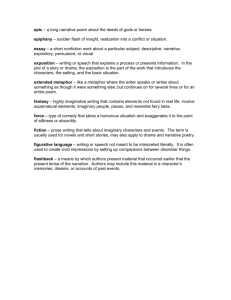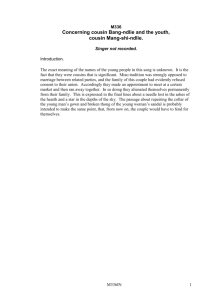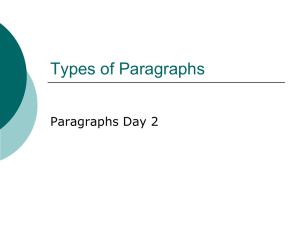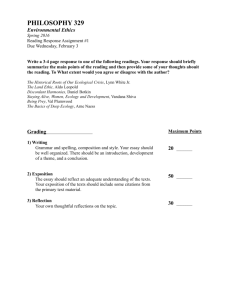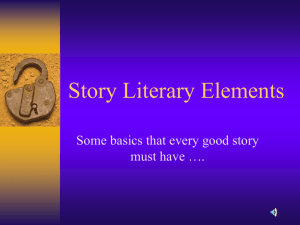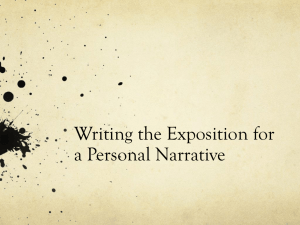the body and soul of writing
advertisement
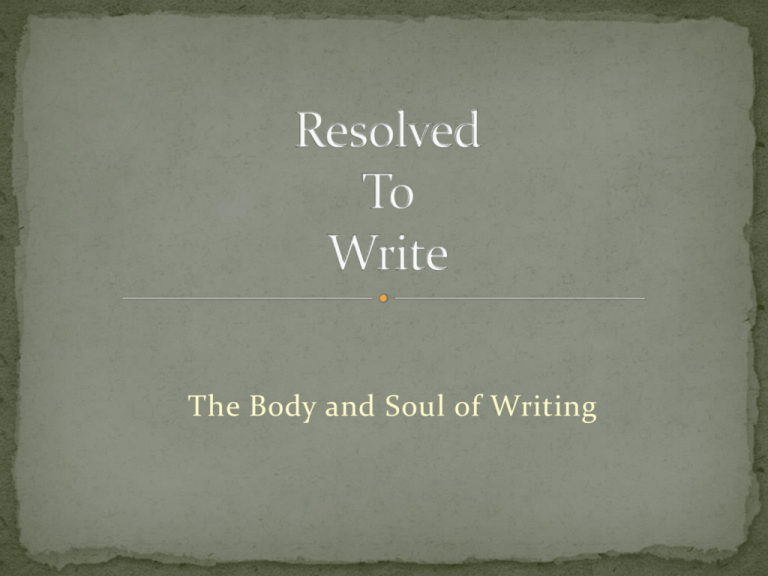
The Body and Soul of Writing What Works, Works Story Characters in Conflict Scene Setting the Stage Voice The Heart of the Reading Experience Emotional Vibrancy Capture your readers through their emotions Exposition Rising Action Climax Falling Action Dénouement Sets up story and ends with inciting incident Obstacles, problems, trouble Comedy-, things go bad. Tragedythings go well. Moment of Conflicts are reversal after resolved. the climax, Catharsis. final suspense. Hook me! Show me conflict! Show me huge Start wrapping Give me a change! things up feeling a that lingers Character Arc – How does the hero change over the course of the story? Hero at the beginning couldn’t defeat the villain Beware of passive\weak characters Villains are people too! Embrace the archetypes P.O.V. Setting The movie camera of our imagination… Show Me, Don’t Tell Me! Point of view (literature) or narrative mode, the perspective of the narrative voice; the pronoun used in narration. Point of view (literature) - Wikipedia, the free encyclopedia! Who should be telling your story? Why? Close 3rd Person versus God-like Power! Time? Place? Color of the curtains? The details you use are the details your P.O.V. character sees. Setting the stage and establishing P.O.V. right away at the beginning of every chapter. For a narrative, the exposition is the author's providing of some information to the audience about the plot, characters' histories, setting, and theme. Exposition (narrative) - Wikipedia, the free encyclopedia! Scene work is visceral. Scene work shows us what we are most interested in. Scene work draws us into the conflict. Exposition is a talking head in a documentary Exposition is narration in a movie Exposition is boring Exposition is necessary Exposition as Ammunition! Can you teach voice? Can you imitate voice? Can you spot voice? Voice - the word choice, sentence structure, details and dialogue Lemony Snicket, Ernest Hemingway, Stephen King The spell you cast is in the voice Story and conflict should direct emotions. Show the emotional reactions of your character Make the emotional reactions visceral – how does it feel to lose the love of your life? Definition of VISCERAL 1: felt in or as if in the internal organs of the body : deep <a visceral conviction> 2: not intellectual : instinctive, unreasoning <visceral drives> 3: dealing with crude or elemental emotions : earthy <a visceral novel> www.merriam-webster.com Exposition in Dialogue “Why, Cousin Jimmy, I haven’t seen you since we both found the murdered body of your father, my uncle, on the side of the road by the old cemetery last October before the first snowfall. That’s right around the time I met Janet, the love of my life…” Overwriting Cousin Jimmy was furious. He was scowling so hard I thought his face would fall off. His eyes were glowing with the hot, hellish anger of a righteous angel framed by the Devil for a crime he didn’t commit. His jaws were clamped shut, almost as if Cousin Jimmy had been born angry and the anger had rusted his jaws closed. Prairie Dogs I couldn’t believe Cousin Jimmy’s reaction to the news. He had been full of hot, hellish anger. Kind of like the time we met at the old cemetery last October before the first snowfall. Clichés I stopped Cousin Jimmy in the nick of time because by the time I found her, Janet was as weak as a kitten. Purple Prose Janet’s limp hand was white, white like a swan’s feathers on a winter’s evening with the gray light muffling the world, this weary, weary world, so old, so withdrawn, so hopeless, that never would there be a rosy dawn to warm us— never again, never a dawn, only cold, only winter, only night. P.O.V. Slips Cousin Jimmy wanted Janet at that moment, like had never wanted anyone, ever before, not even when he was sixteen and Darla Plantington had dropped her scarf in front of his house. The overuse of adverbs “Are you serious?” Cousin Jimmy asked quietly. “No, if you’re not,” I said quickly. “Maybe I am,” Cousin Jimmy said mysteriously. Using the slip of paper you are given, do the following: Give us the scene or the opening of the scene Set the stage and establish P.O.V. right away. Avoid the diseases all except your own disease and then do it up right. Look for ways to heighten conflict A novel is a perfect table made from 23 perfectly cut legs What works, works, but this is a subjective business Put your best foot forward Don’t give them a reason to reject you Another writer’s blockage—a more serious blockage—may arise from an excessive need for a success not actually related to good writing: an excessive need to please admirers (that is, to be loved), or prove himself vastly superior to others (that is, to be superhuman), or justify his existence against the too obstreperous cry of some old psychological wound (that is, to be redeemed). No amount of work can solve this writer’s problem, because nothing he writes satisfies the actual motive behind it. --John Gardner, On Becoming a Novelist, 135 Step 1 – Admitted we were powerless over writing and our writing lives had become unmanageable. What are some of your old ideas that keep you away from writing? Where are you powerless over your writing and how is your writing life unmanageable? Fear of Success Fear of Failure The Time Card Self Doubt Critical Voices Thinking Too big Thinking Too small Perfectionism The Lie of Inspiration Envy Despair Step 2 – Came to believe that a power greater than ourselves could restore us to sanity What does a sane writer look like? Step 3 – Made a decision to turn our will and our lives over to a power greater than ourselves For me, writing is the hope that life is good, that I am good, that there is a purpose, a reason, for all of this pain and chaos. When I write, I am affirming life’s inherent goodness. This is my sacred, secret dream. When I write, I am spitting in the face of doubt, despair, and death. We write alone, but we are not alone. How do we become successful? Honesty Open-mindedness Willingness •Books •Conferences •Workshops •Critique Groups •Other writers •Friends •Spiritual Advisors •Therapists Be Strong, Be Daring, Be Impossibly Courageous! Why Not You? Listen to the MUSTN'TS, child, Listen to the DON'TS Listen to the SHOULDN'TS The IMPOSSIBLES, the WON'TS Listen to the NEVER HAVES Then listen close to me -Anything can happen, child ANYTHING can be. -Shel Silverstein Once writing has become your major vice and greatest pleasure only death can stop it -Ernest Hemingway The Artists Way by Julia Cameron On Writing by Stephen King Bird by Bird by Ann Lamont Writing 21st Century Fiction: High Impact Techniques for Exceptional Storytelling by Donald Maass The Novel Writer’s Toolkit by Bob Mayer Story by Robert McKee Save the Cat! by Blake Snyder WWW.AARONMRITCHEY.COM WWW.FACEBOOK.COM\THENEVERPRAYER AARONMRITCHEY@GMAIL.COM

